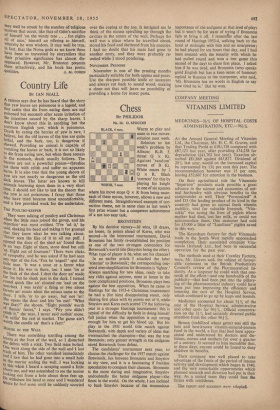Chess
BLACK, 6 mon.
WHITE, 7 men.
WHITE to play and mate in two moves: solution next week.
Solution to last week's problem by Allison: R—R 5, threat Q x Kt. Against 'random' moves of B Kt, White mates by 2 Q x R. Black 'corrects' for this by playing his knight to one of six squares where his move stops Q x R from being mate: each of these moves, however, allows a new and different mate. Straightforward example of cor- rection theme, not in same class as last week's first prize winner but a competent achievement of a not too easy task.
BRONSTEIN By his decisive victory-10 wins, 10 draws, no losses, li points ahead of Keres, who was second—in the interzonal tournament, David Bronstein has firmly re-established his position as one of the two strongest contenders for Botwinnik's world title (Smyslov being the other). What type of player is he, what are his chances?
In an earlier article I attached the label 'scientist' to Botwinnik; the corresponding one- word over-simplification for Bronstein is 'fighter.' Always searching for new ideas, ready to take any risks against anyone, most at home in the most complicated positions, Bronstein plays best against the best opposition. When he came to Hastings for the 1953-4 Christmas tournament he had a (for him) disappointing result, only sharing first place with 6i points out of 9, while Smyslov and Keres each scored 7/9 the following year in a stronger Hastings tournament: this is typical of the difficulty he finds in doing himself full justice when the opposition is not strong enough for him to get his blood up. But his play in the 1951 world title match against Botwinnik, with depth and variety of ideas that overmatched the champion—that was the true Bronstein; only greater strength in the endgame saved Botwinnik from defeat.
The candidates' tournament next year, to choose the challenger for the 1957 match against Botwinnik, lies between Bronstein and Smyslov in my view, and it is a fascinating if fruitless speculation to compare their chances. Bronstein is the more daring and imaginative, Smyslov undoubtedly the better endgame player—the finest in the world. On the whole, I am inclined to back Smyslov because of the tremendous
importance of the endgame at that level of play; but it won't be for want of trying if Bronstein fails to bring it off. 1 rememBer after the last round of Hastings 1953-4, walking back to the hotel at midnight with him and an interpreter; he had played for ten hours that day, and I had been amazed with the tenacity with which he had pulled round and won a lost game ,(his second of the day) to share first place. I asked him if he was tired, and Bronstein (who speaks good English but has a keen sense of humour) replied in Russian to the interpreter, who said, 'Mr. Bronstein has no words in English to say how tired he is.' But he won.










































































 Previous page
Previous page